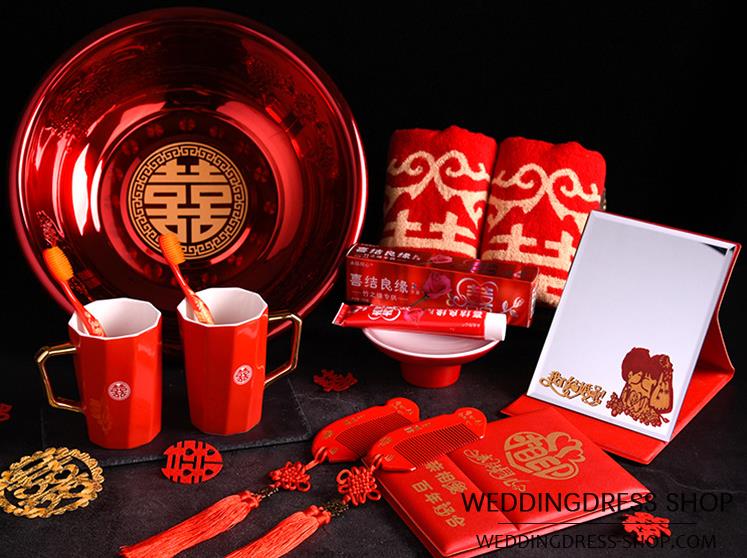Dowry and dowries are unavoidable topics in the marriage process. Some people end up arguing over dowries, and after discussing dowries, the question of what dowry to return is also a concern. This article takes you to a comprehensive understanding of dowry, including what dowry is, the difference between dowry and dowries, what dowries are, as well as some definitions and psychological issues related to dowry.
1、 Definition of dowry
Dowry, also known as dowry, is prepared by the bride's family with the purpose of earning a decent living.
1. What is dowry
Dowry, also known as dowry, is a dowry prepared by the bride's family for the bride during marriage, usually including money and objects.
The purpose of dowry is twofold: on one hand, it is used to support a better life for the new family; on the other hand, the amount of dowry reflects the status and face of the bride's family, and also relates to the bride's position in the groom's family, preventing her from being underestimated by the groom's family.
2. The difference between dowries and dowries
One of the differences between dowry and dowries is that dowry is prepared by the bride's family to be sent to the groom's family, while dowries are prepared by the groom's family to be sent to the bride's family.
The dowry is usually chosen before marriage or sent to the bride's family by the groom's parents or representatives during engagement, while the dowry is sent to the groom's family along with the bride on the day of marriage.
The dowry and dowry items are also different.

2、 What is usually included in a dowry
Bridal dowry is a custom, and the dowry items may vary depending on the region, but some basic dowries will also be included.
1. The basic dowry prepared by the bride
The basic dowry that the bride usually has upon marriage includes cash, bedding, luggage, early birth of precious children (red dates, peanuts, longan, and lotus seeds), a kettle, slippers, towels, toiletries, washbasins, bed dolls, wedding eggs, etc.
Most brides will have the basic dowry mentioned above, and if the color can be red, it should be red and labeled with the word 'happy'. Previously, dowry items also included electrical appliances, but dowry appliances were relatively large in size and inconvenient to carry. Nowadays, they are generally converted into money.
Some women come from well-off families and even accompany them with cars or houses, which goes beyond the scope of basic dowry.
2. Proportion of dowries and dowries
There is no explicit regulation in national laws on the ratio of dowries to dowries, which is generally more than half of the value of dowries. In some cases, even for women from well-off families, dowries may exceed dowries. For example, in Wenzhou, most female families not only return the dowry to the male partner, but also accompany the groom with a wedding car and other dowry items.
The ratio of dowries to dowries was explicitly stipulated by law in the Song Dynasty, when the "Song Penal Code" stipulated that dowries should be at least half or more of the dowries. It has probably evolved into the current tacit understanding of the ratio of dowries and dowries.

3、 Who is the dowry given to
The earliest dowry was used by the mother's family to support the new family, while also preparing private money for the daughter.
1. Is the dowry given to the man or the woman
The dowry is brought by the bride to the groom, and to some extent, the groom can use the dowry. Why?
At first, the purpose of dowry was a financial support provided by the mother's family to help her daughter marry the man without hardship and to facilitate the development of the new family. In this sense, the man could use the dowry.
In addition, the bride's family can also prepare some money for their daughter as private money in addition to the dowry, which is commonly known as "keeping the bottom of the box", and this money has nothing to do with the groom.
2. Is dowry a joint property of husband and wife
Whether the dowry belongs to the joint property of husband and wife depends on whether it is given before or after the marriage registration. Before registration, it belongs to the female party, and after registration, it belongs to the joint property.
According to Articles 17 and 18 of the Marriage Law, the dowry sent before marriage registration shall be recognized as the pre marital personal property of the female party, and shall be recognized as belonging to the female party upon divorce. The dowry accompanying marriage registration should generally be recognized as joint property of the couple, but if there is a special agreement on property between the two parties, it should be handled according to the agreement.
Article 19 of the Marriage Law stipulates that "husband and wife may agree that the property obtained during the existence of the marriage relationship and the pre marital property shall be owned separately, jointly, or partially separately or partially jointly. The agreement shall be in writing".

4、 The etiquette of giving dowry
1. Time for giving dowry
The dowry is usually delivered to the groom's home by the bride's family on the morning before the wedding or two days in advance. However, nowadays many groom's families will arrange a wedding car specifically to carry the dowry on their wedding day.
2. Packaging of dowry
All dowry items should be tied with red silk cloth to show celebration, and parents should also put red envelopes on the four corners of the dowry box.
3. The way of giving dowry
The dowry items, the number of people giving the dowry, and the vehicles must all be even numbers, which implies that good things come in pairs. Accompanying items such as beds, pots, and clocks are not allowed as they are considered unlucky.
In addition, when delivering the dowry, the bride should not send her immediate family members with her. Instead, she should ask a boy who is close to her to hold the key to the dowry box, also known as "escorting the dowry".
5、 Regarding dowry psychology
There have been many controversies surrounding dowries and dowries, such as the fact that if a woman does not give her dowry, it is one of them.
1. Is it shameful for a woman not to marry without a dowry
In the matter of marriage, elders tend to follow traditional customs and receive some dowry items regardless of the amount of dowry received. If there is a dowry but no dowry, it may become a topic of conversation for those who are not aware of it, thinking that the bride does not understand etiquette.
However, in the end, dowries and dowries are both voluntary matters, as long as both parties agree in advance, there is no need to pay too much attention to other people's opinions.
2. How to deal with parents not giving dowry
If the bride's parents do not give a dowry, it should be considered according to the situation. If the groom does not give a dowry, it is reasonable for the bride not to marry.
The man gave a dowry but the woman's parents didn't give it, which is hard to justify and feels like selling their daughter. It is difficult for the man to come forward and marry the woman, so the girl should mediate.
When communicating with parents, girls should first understand why their parents do not give a dowry. If the conditions do not allow it, then they should discuss with their husband and dowry within the allowed range, and both parties will be happy.
summary
The dowry is considered as a financial support from the bride's family to the new family, usually consisting of money and in kind items. The specific dowry should be determined according to local customs, and some are basic dowry items that are common throughout the country. The ownership of the dowry is legally determined based on the time of marriage registration. It is recommended that the man in the marriage relationship try not to worry about the dowry as much as possible, so that the wife can take care of it with more peace of mind.